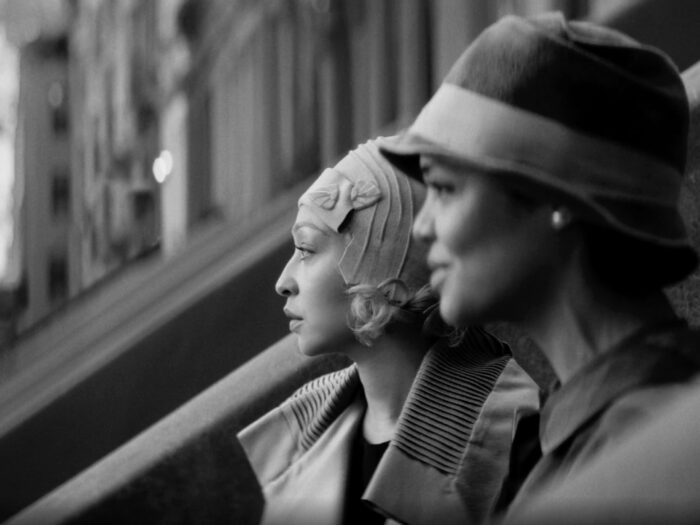Netflix UK film review: Passing
Review Overview
Performances
8Perception
8Empathy
8David Farnor | On 13, Nov 2021
Director: Rebecca Hall
Cast: Tessa Thompson, Ruth Negga, André Holland
Certificate: 15
Where to watch Passing online in the UK: Netflix UK
“You’re happy. You have a true, good life. And you’re free.” Those are the words of Clare Kendry (Ruth Negga) to her childhood friend, Irene Redfield (Tessa Thompson), after they cross paths years after drifting apart. The two Black women have ended up in very different places: Irene is married to a respected doctor, Brian (the superb André Holland), and lives in Harlem with their kids; Clare is also married but lives mostly in Europe with her husband, John Bellew (Alexander Skarsgård). The main difference between them, though, is much deeper than that: Clare has used her lighter skin tone to “pass” as white. Even her husband doesn’t realise that she’s Black.
In segregated 1920s America, Clare presents this as a bold act of reinvention, opening up her horizons and enabling her to life the high life. She sashays through the world with a confidence that’s seductive, even able to insinuate herself into Irene’s social circle with apparent ease. Irene becomes jealous of the freedom and attention Clare enjoys wherever she goes – including, it seems, attention from her husband.
But it rapidly becomes clear that Clare’s life is, in reality, far from the perfect facade she projects – her husband, we learn, is a racist and Clare has to pretend not only to be something she’s not but also to share his hatred of people of colour. After beholding Irene’s comfortable domestic life, Clare begins to feel a homesickness for her life and identity.
And so the too women are driven together by a mirrored sense of desire and longing to escape the traps they’re in. The more intertwined their existences become, the more their dissatisfaction fuels a twisted cycle of obsession and repression, with Irene unable to shake off being complicit in Clare’s deceit and Clare unable to ignore that, while Irene pretends there’s no judgement, there can’t not be – especially when Clare’s husband is full of nothing but prejudice.
What ensues is a shrewd study of identity, especially in the way that identities are constructed through performance. The career-best turns by Ruth Negga and Tessa Thompson are physical in every detail, from their remarkable body language to their subtle non-verbal reactions, and their shifting dynamic is fascinating to witness, as they change the way they behave, speak and interact depending on the context they’re in, and whether they’re on their own or together.
Rebecca Hall, who penned the script from Nella Larsen’s 1929 novel, uses that to draw out the universal nature of passing; everybody passes to some degree, whether in terms of class, gender, domestic bliss, sexuality or, most often, a intersection of all of them and more. In a world of labels and categories, Hall’s thoughtful drama allows room for such complexities, and understands the way that people can lie to themselves even more than they do to others, as they strive for some sense of authenticity and happiness. “You’d think they’d be satisfied being white,” remarks Irene. “Who’s satisfied being anything?” retorts Brian.
Hall might seem like an unusual fit for the project, but her mother in the 1950s frequently passed, which gives Hall a personal understanding of the pride and unspoken shame that can come with it. She’s talked about the impact the film Imitation of Life had upon her, and she’s produced something similarly powerful, cathartic and empathetic for generations to come.
The decision to film the movie in black-and-white is intrinsic to its mesmerising effect, not least because the story is anything but: DoP Eduard Grau (A Single Man) paints with a gorgeous array of shades and tones, even as the film’s monochrome canvas captures the way some of those differences can be overlooked by people every day.
The 4:3 aspect ratio brings a sense of confinement and intensity to events, but also highlights the way these themes are being examined through a conscious lens. Because at Passing’s heart is the act of looking and the subjective nature of perception. Irene and Clare’s unhappiness is only something they begin to see after comparing their lives to each other’s; the dichotomies of truth and deceit, success and sadness are refracted through the way they view their lives in someone else’s shadow. Hall’s camera is impeccable at framing things from one character’s perspective, before catching another person gazing at them and pushing us through that conflicting window – and prompting us to reassess everything we observe.
From Irene and Clare’s electrifying first encounter, that increasingly thorny maze of mirrors and viewpoints transforms an initially catty tale of curiosity into an intimate, probing, unnerving psychological thriller. There’s something Hitchcockian in its simmering tension that quietly builds to a stunningly nuanced climax. It’s a striking, lingering directorial debut, as crisply crafted and carefully trodden as footprints in freshly fallen snow.
Passing is available on Netflix UK, as part of an £9.99 monthly subscription.




















